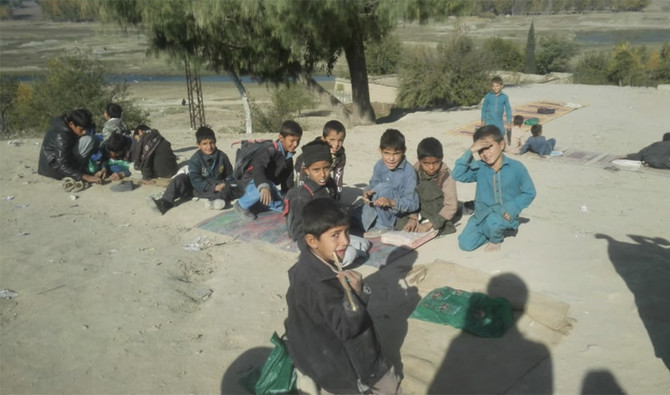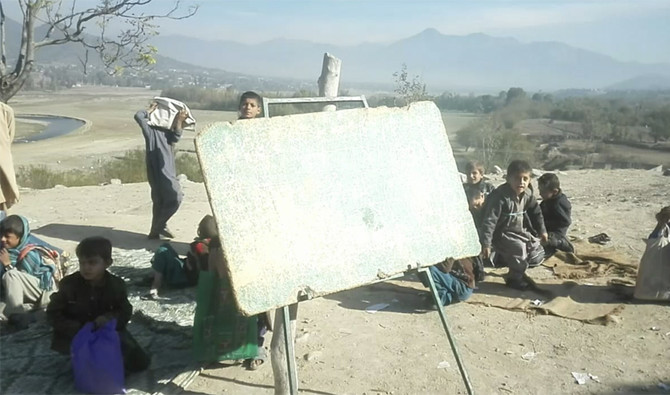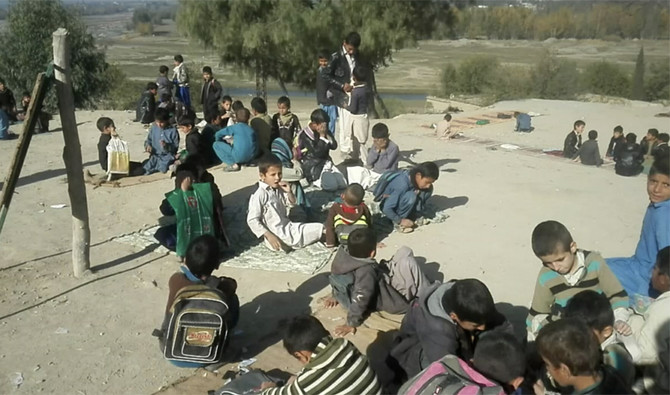PESHAWAR: Staying true to his campaign and electoral promises, Prime Minister Imran Khan ensured that the Federally Administered Tribal Area (FATA) was eventually merged with the Khyber Pakhtunkhwa (KP) province. When the bill finally became a law in May this year, it gave residents ample reasons to celebrate.
However, today, nearly six months after the merger, several complained that children were being denied their basic right to education, which continues to remain a distant dream. Tribesmen from the volatile region who urged the government to prioritize the education sector said that hundreds of children had dropped out of school as they were forced to study in the open due to a lack of properly-constructed facilities in the South Waziristan, Bajaur and other tribal districts.
Sikandar Mehsud, a tribesman from South Waziristan, said that at least 204 children study under a tree in Shereen Khel -- a small village on the outskirts of Makeen -- once regarded as the epicenter of insurgency and the hometown of former Tehrik-e-Taliban Pakistan leader, Baitullah Mehsud.
Surrounded by gigantic mountains, the Shereen Khel village boasts a population of roughly 2,000 but has no buildings for its schools. Mir Kalam, a tribesman from the area said that because of this reason he has been teaching children for the past one year without getting any incentives for his services. “I teach children voluntarily to create awareness among them and to make them responsible citizens of the country,” Kalam said.
Back in 2009, when the Pakistani military launched its operations to stamp out militants from the South Waziristan region, it triggered a mass exodus of local families. However, they have since been repatriated to their respective villages in the district, according to Sayed Umar, a coordinator at the South Waziristan FATA Disaster Management Authority.
The children, however, continue to lack access to basic education. “Roughly, around 400,000 children are out of school in the tribal areas but plans are being implemented to enroll them,” Shoaib Khan, a senior official at the FATA Education Directorate, said.
He said that around 1,000 to 1,100 educational institutions are either damaged or non-functional across the region bordering Afghanistan, adding that the government, in collaboration with foreign donors such as the UNDP, had plans to rebuild all the schools and colleges in the area and ensure they were fully functional.
Maulana Jamaluddin, a lawmaker from the region told Arab News that he has been apprised of the issue and has taken it up with the relevant authorities to build a proper facility for children in Shereen Khel. “I have already told the FATA Education Directorate to expedite the process to rebuild the damaged institutions,” he added.
Another example is of the 200 children who have been attending classes in the open fields of Khayati, another dusty hamlet in the Bajaur tribal district. Said Munir, a teacher at the Maktab Primary School in Tehsil Utmankhel, told Arab News that the school has no drinking water, furniture, boundary walls or washroom facilities.
He added that the educational institution -- operational since 1985 – boasted a strength of 400 students which has now been reduced to 160 because the parents did not want their children to study under the open sky. “This school can be turned into one of the best educational institutions if the government provides us with the much-needed facilities such as buildings and infrastructure,” Munir said.
Misbahuddin Khan, a social activist from the Bajaur region said that the school has been functional for the past 20 years despite a lack of infrastructure. However, during harsh weather conditions, children often choose to skip school. “Most of the times in summer and winter, children fall ill because of the hostile weather conditions,” Khan added.
He reasoned that since most of the families have been repatriated, the government should take accelerated measures to work towards the construction of school buildings or to rebuild institutes that were damaged during military operations. Khan said that the FATA Secretariat and FATA Education Directorate have been informed about the problem, but concrete measures have yet to be taken to address the issue.
Another issue at hand, as highlighted by Mehsud, was that despite some educational institutions being housed in a proper facility, the schools or colleges remain non-functional due to a lack of teaching staff. Case in point being the Girls Degree College -- built in 2016 in the Ladha area of the South Waziristan region -- which has a sprawling building but has yet to hire teachers.
Samreen Mehsud, a college student, demanded that the government expedites the hiring process so that girls and women in the area can make full use of the facility at hand. She added that several children are either deprived of an education or forced to go to other cities of the country for higher studies.
Another school in Mamakhel, a small village located in the Orakzai tribal district, is in shambles, too. With two rooms for more than 300 students, a majority of the students were forced to attend classes conducted in tents as the rooms' roof, doors, and windows were damaged.
Not a minor problem: 400,000 children deprived of education in tribal districts
Not a minor problem: 400,000 children deprived of education in tribal districts

- Lack of schools and facilities major reason for students in KP province to opt out
- Residents urge government to prioritize measures for increased levels of literacy in the region
Firefighter killed in Karachi blaze leaves family to mourn second generation lost in line of duty

- Father of fallen firefighter also died in service years earlier, leaving family to mourn second line-of-duty death
- Chronic shortages of fire engines, protective gear and trained staff strain Karachi’s emergency response
KARACHI: When flames tore through Karachi’s Gul Plaza last weekend, 29-year-old firefighter Furqan Shaukat moved deeper into the burning building as its structure weakened, responding to calls for help from inside moments before the plaza collapsed.
The category-three fire gutted around 1,200 shops in one of Karachi’s busiest commercial districts, killed scores of people and left dozens missing. It also exposed, once again, the extreme risks faced by firefighters in Pakistan’s largest city, particularly when battling intense blazes inside sealed commercial structures built with little regard for safety standards.
Karachi, home to more than 20 million people, operates with just over 20 fire stations and an estimated 120–140 fire tenders, many of them aging or partially functional, according to figures cited by the Karachi Metropolitan Corporation and provincial officials over the years. The city’s fire brigade is believed to have fewer than 2,000 firefighters, far below international benchmarks for a megacity of its size, with no citywide hydrant system and chronic shortages of modern protective gear.
“We are told that someone shouted from inside [the building], saying, ‘Save me,’” Shaukat’s brother Muhammad Nauman told Arab News. “Many people were standing outside, but it was him who said, ‘No, I have to save this man.’”
For Shaukat’s family, the loss is not a single tragedy, but the second in a line of service stretching across generations.
Born into a household tied to Karachi’s Fire Brigade, Shaukat followed his father into a profession defined by danger and limited protection. His father served for 35 years, was paralyzed on duty, and later died while still in service in 2018.
“Furqan was my youngest brother,” his sister Shumaila Shaukat said, struggling to contain her grief. “He was very talented, good and intelligent.”
“Since childhood, he had a passion for helping people,” she added. “We didn’t know that our brother would pass away so soon.”
Shaukat had joined the Karachi Fire Brigade just three years ago and was the youngest member of his team. He leaves behind a young widow and an infant son, Muhammad Rahim.
“Furqan wanted to make him [Rahim] a lawyer,” Shumaila said. “I will teach him law.”
SEALED INFERNOS
Fires inside enclosed commercial buildings like Gul Plaza are among the most dangerous scenarios firefighters face anywhere in the world. In Karachi, those dangers are magnified by overcrowded markets, illegal structural modifications, poor access routes and the absence of sprinkler systems, fire exits and heat-resistant materials.
Compounding those risks is the lack of equipment. Fire officials and court submissions have repeatedly pointed to shortages of breathing apparatus, fire-resistant suits, thermal imaging cameras and high-rise rescue training, leaving firefighters to confront extreme heat and toxic smoke with minimal protection.
On the night of the fire, Shaukat’s family remained awake, tracking updates and waiting anxiously.
“We were all restless that night,” Nauman recalled. “We knew he was in the fire, and we were all worried.”
Veteran fire officer Wajid Ali, who was working alongside Shaukat, said he spoke to him shortly before the collapse.
“He told me to be careful … I told him, ‘You do the same as you are young and a newcomer,’” Ali said.
As the blaze intensified and the building’s integrity failed, Ali said Shaukat attempted to retreat.
“When the building collapsed his team ran away,” he said. “Furqan also tried to run but stumbled and fell. The debris fell all over him and he died because of that.”
His injuries reflected both the intensity of the fire and the lack of protective equipment.
“His entire back was burned. His face was burned. His hands were burned. His entire body was burned,” Nauman said, rejecting claims circulating online that firefighters had been idle during the operation.
Nauman said Shaukat and his colleagues were confronting a modern, high-risk blaze without the gear such conditions demand.
“Firefighters must care about their safety,” he said. “As I told you they should get a [protective] suit as we saw Furqan going inside in a uniform only.”
“What safety did he have,” he asked. “Furqan would not have burned so badly if he had some safety. Give them the equipment they need.”
Ali said fires like Gul Plaza increasingly fall into the most dangerous category, requiring specialized training, protective suits and breathing equipment, resources firefighters in Pakistan often lack.
Karachi Chief Fire Officer Muhammad Humayun Khan said negligence in basic fire-safety measures continues to fuel deadly blazes across the city.
“If you are doing a business, then try to get a fire extinguisher or get some consultancy, there is no harm in that,” he said.
For Shaukat’s family, however, the policy failures and structural weaknesses translate into something deeply personal.
“We lost our little hero,” Shumaila said. “He left the world, but he will always be with us.”













